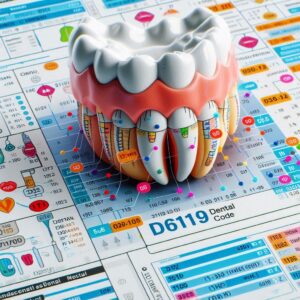D6119 Dental Code: Implant-Supported Dentures
The D6119 dental code refers to implant-supported dentures for the edentulous arch, a revolutionary solution for patients missing all teeth in one or both arches. Unlike traditional dentures, which rest on the gums, implant-supported dentures are anchored securely to dental implants, providing superior stability, functionality, and comfort.
This code is specifically used by dental professionals for billing and insurance purposes, ensuring standardized documentation. The American Dental Association (ADA) maintains this code under the Category III (emerging technology) or Category I (established procedures), depending on the specific application.
Why Is D6119 Important?
-
Provides a permanent, non-removable solution for tooth loss.
-
Enhances chewing efficiency and speech clarity.
-
Prevents bone loss, a common issue with traditional dentures.

2. Understanding Implant-Supported Dentures
Implant-supported dentures are prosthetic teeth fixed onto dental implants surgically placed in the jawbone. These dentures can be:
-
Fixed (Hybrid Dentures): Permanently attached and only removable by a dentist.
-
Removable (Overdentures): Snap onto implants but can be taken out for cleaning.
How Do They Work?
-
Implants are placed into the jawbone (typically 4-6 per arch).
-
Abutments connect the implants to the denture.
-
The denture is secured, either via screws or attachments.
3. Types of Implant-Supported Dentures
| Type | Description | Best For |
|---|---|---|
| Bar-Retained | A metal bar connects implants, and the denture clips onto it. | Patients with moderate bone loss |
| Ball-Retained | Implants have ball attachments that snap into the denture. | Simpler, cost-effective option |
| Fixed Hybrid | A full-arch prosthesis screwed directly into implants (non-removable). | Maximum stability & function |
4. Benefits of D6119 Over Traditional Dentures
✅ No Slipping or Discomfort – Unlike traditional dentures, implant-supported ones stay firmly in place.
✅ Improved Chewing & Nutrition – Patients can eat tough foods (steak, apples) without worry.
✅ Bone Preservation – Implants stimulate the jawbone, preventing deterioration.
✅ Long-Term Durability – Lasts 15+ years with proper care, compared to 5-7 years for regular dentures.
5. Who Is a Candidate for Implant-Supported Dentures?
Ideal Candidates:
✔ Patients missing all teeth in one or both arches.
✔ Those with sufficient jawbone density (or willing to undergo bone grafting).
✔ Non-smokers or willing to quit (smoking affects healing).
Not Suitable For:
❌ Patients with severe osteoporosis.
❌ Those unwilling to undergo surgery.
6. The Procedure: Step-by-Step Process
-
Consultation & Imaging (CT scans, X-rays).
-
Bone Grafting (if needed) to strengthen the jawbone.
-
Implant Placement (surgery under local anesthesia).
-
Healing Period (3-6 months for osseointegration).
-
Abutment Attachment.
-
Denture Fabrication & Fitting.
7. Cost and Insurance Coverage for D6119
The average cost ranges from $15,000 to $30,000 per arch, depending on:
-
Number of implants needed.
-
Material (acrylic vs. porcelain).
-
Geographic location.
Does Insurance Cover D6119?
-
Medicare: Usually does not cover implants.
-
Private Insurance: Partial coverage possible (check plan details).
-
Financing Options: Many dental offices offer payment plans.
8. Maintenance and Longevity
Daily Cleaning: Brush around implants, use a water flosser.
Regular Dental Visits: Check-ups every 6 months.
Avoid Hard Foods: Excessive force can damage the denture.
With proper care, implant-supported dentures can last 15-20 years.
9. Potential Risks and Complications
⚠ Infection (peri-implantitis).
⚠ Implant Failure (if osseointegration fails).
⚠ Nerve Damage (rare, but possible if implants are misplaced).
10. Comparing D6119 to Other Dental Implant Codes
| Code | Description | Key Difference |
|---|---|---|
| D6010 | Surgical placement of a single implant. | For single teeth, not full arches. |
| D6104 | Bone graft for implant placement. | Supplemental procedure, not the denture itself. |
11. FAQs About D6119 Dental Code
Q1: Is the D6119 procedure painful?
A: Local anesthesia ensures minimal discomfort; soreness afterward is manageable with medication.
Q2: How long does the entire process take?
A: Typically 6-12 months, including healing time.
Q3: Can I sleep with implant-supported dentures?
A: Fixed ones stay in; removable ones should be taken out for cleaning.
=12. Conclusion
The D6119 dental code represents a life-changing solution for edentulous patients, offering stability, functionality, and confidence. While the cost and procedure time may be higher than traditional dentures, the long-term benefits make it a worthwhile investment. Consult with a prosthodontist to determine if implant-supported dentures are right for you.


